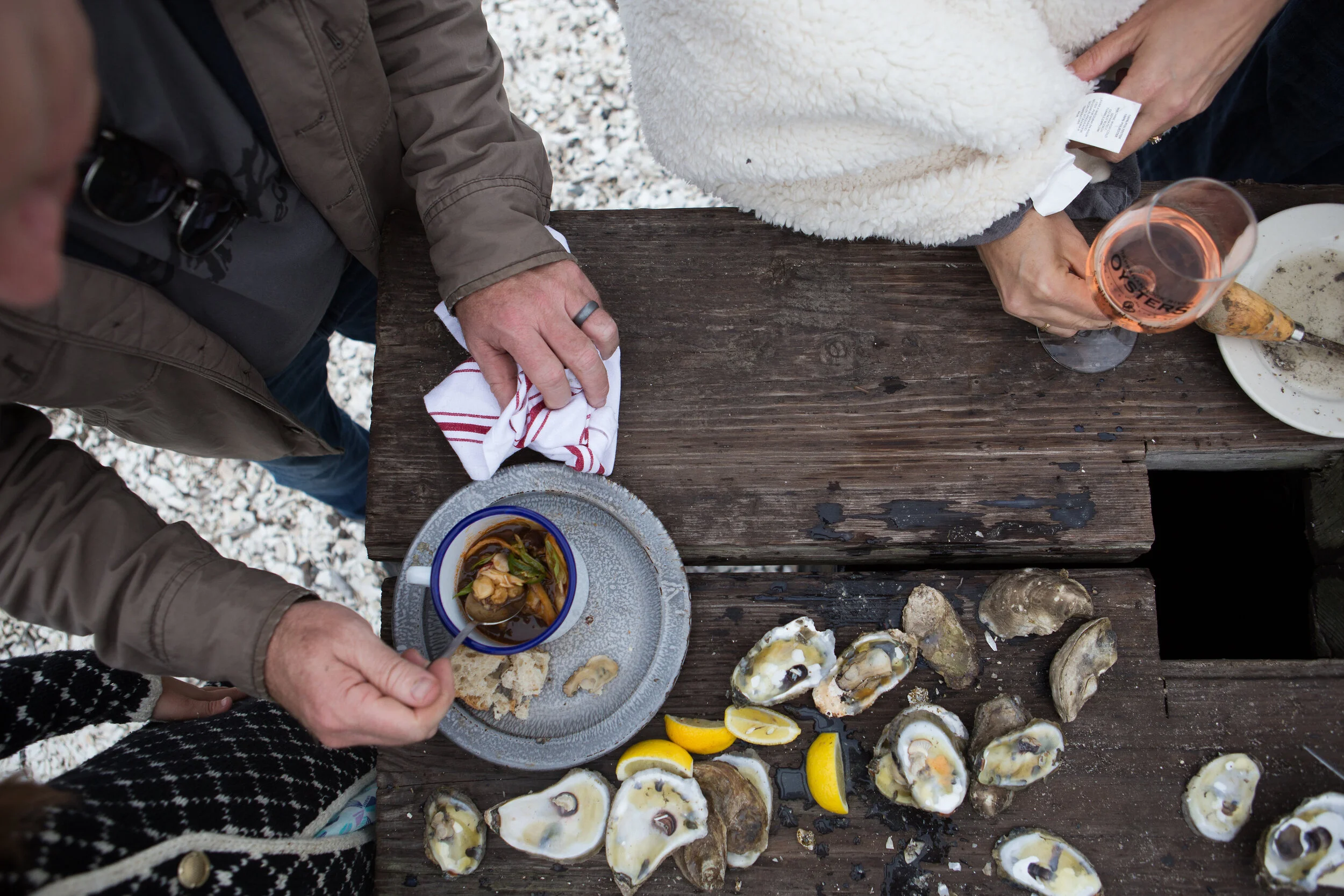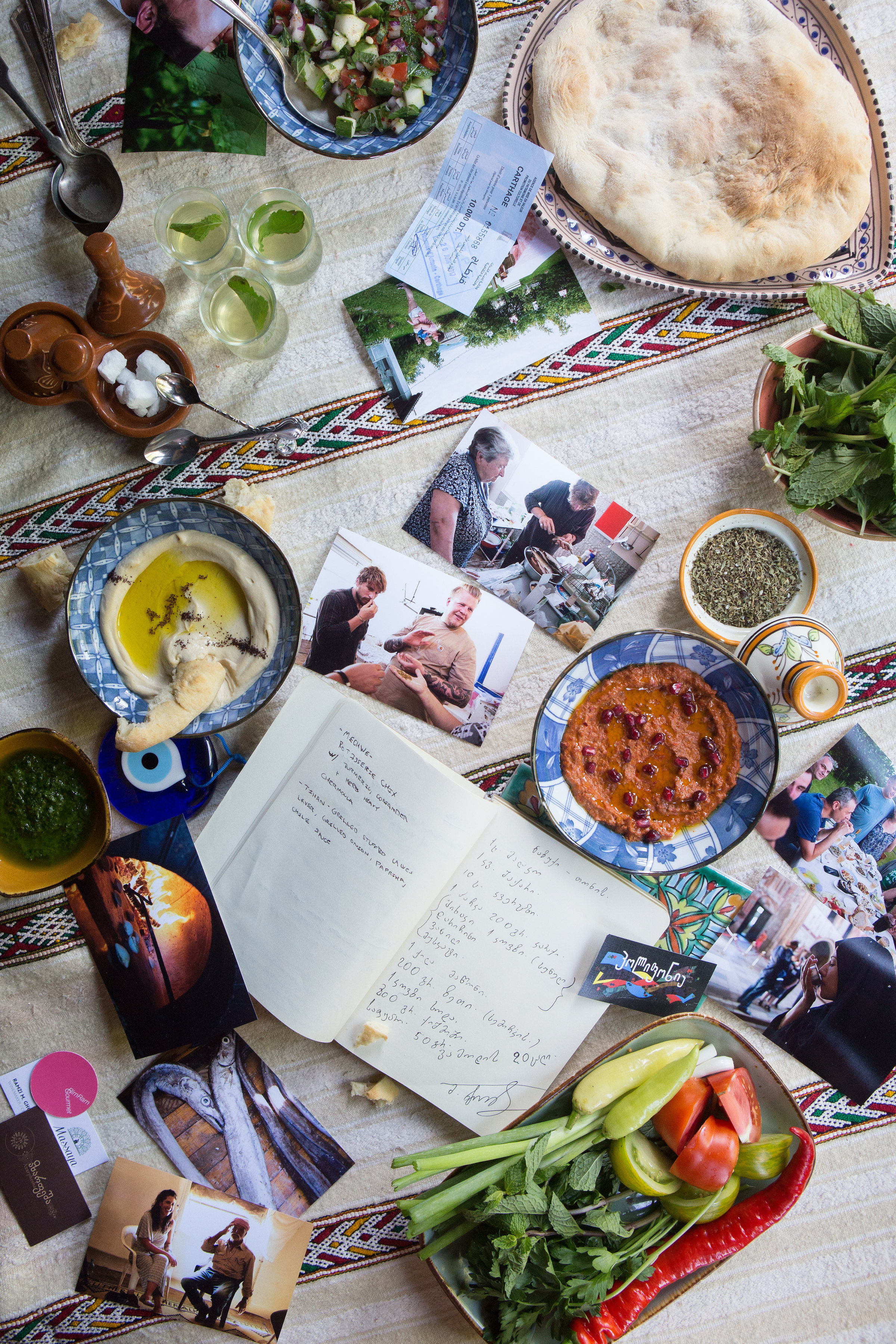A Culinary Research Journey Along the Silk Road
/Grandmothers Provide Inspiration for the Maydan Team
By Lani Furbank, Photography by Jennifer Chase
The team behind popular DC restaurant Compass Rose recently returned from a 36-day trip through Morocco, Tunisia, Georgia, Lebanon and Turkey. Owner Rose Previte says with a laugh, “It wasn’t a vacation. [We] came back with scars, and I’m proud of them. I think we all are. We’re, like, ‘We did it. And we said never said no to trying anything.’”
Their eight-person caravan traversed more than 15 cities and 10 open air markets, tracing the path of the Silk Road and ancient migration routes. Leaving no stone unturned, the team started their days with 5am wake-up calls, then long drives across rural countrysides and transcontinental flights in the middle of the night. It was all in preparation for their new venture, Maydan, which is set to open this October.
Inspiration for the forthcoming restaurant stems from the shared use of the term maydan throughout the Caucasus, North Africa and the Middle East, which Previte first encountered while living in Russia. The word, regardless of varying spellings and pronunciations, refers to a town square or a central gathering place in a city. “It’s an Arabic root to the word, but all these cultures use it, whether they speak Farsi or Georgian or North African dialects of Arabic,” Previte explains.
Owner Rose Previte is flanked by her two chefs, Chris Morgan (left) and Gerald Addison (right).
Maydan will embody the energy of a city’s center. “We are trying to create a gathering place, or somewhere that everyone can come together,” Previte says. “We really just want people to mingle and gather and make friends with strangers.” As guests enter the restaurant, they’ll walk into the square, which will house a wood-fired hearth and a large bar. On the mezzanine level above, there will be 60 seats for family-style dining.
The menu will feature cuisine from the countries the team explored on their trip, as well as Iran and Syria, which weren’t on the itinerary due to safety concerns. Previte refers to these areas of the world as forbidden lands. “I think these cuisines are underrepresented in the U.S., but it’s because they’ve been kept from us. The average American can’t go there,” she says. Still, they gained insight into the cooking traditions of Iran and Syria through Georgia and Lebanon. “We got as close as we possibly could. At one point, we were 12 miles from the Syrian border,” Previte says.
The culinary history of these regions is intertwined with migration patterns. “A lot of dishes that once started in Old-World Persia, you’ll find in Georgia,” Chef Chris Morgan explains. “You’ll try something in Morocco, and then you’ll go to Lebanon and have something that’s almost the same dish.” That’s where the lines become blurred. “Everyone always argues where everything comes from,” he says. “‘We were the first to do this’ is one of the most common lines I think I heard the entire trip.”
Maydan Muhamara
One way to trace the evolution of food traditions is by taking a deep dive into baking. “You can really see how migration affected food,” Previte says. “The easiest way to see it is the bread.”
“It’s really wild to see how similar the breads are between those countries,” Morgan adds. “Everyone in those countries uses bread as a vessel, and it brings people together. Everybody breaks bread at every meal, which is something we find really exciting and want people to do at Maydan.”
To that end, Maydan will have a traditional bread oven, which is called a toné in Georgia. The clay vessel is similar to a tandoor, and variations of it can be found throughout the region. Mastering how to use it was a top priority during the team’s research endeavor, but instead of turning to cookbooks or highly trained chefs, Previte wanted her team to learn from the true experts: grandmas.
So, the trip’s itinerary was crafted to put the two executive chefs, Morgan and Gerald Addison, in the kitchens of women who build these ovens themselves and brave flames and 500° temperatures daily to perfectly craft their bread by hand. “I quickly learned my threshold for heat is not as good as theirs is,” Morgan jokes.
Previte found these international hostesses thanks to the Compass Rose clientele and their wide-ranging social and professional webs. “You can find people anywhere in the world through a restaurant in DC, I swear by that,” she says. “I don’t know if any other city in the country you would have connections like that.”
The skeleton of their trip was built on contacts from friends of friends, but many of their days morphed into something entirely different. “Every person I talked to would just be so kind,” Morgan says. They’d say, “‘Oh, you want to learn how to make that? Let me call my aunt,’ and they’d literally, on the spot, call that person, and then an hour later, I’d be at their door, walking in, and then they’d give you a hug, sit you down, and just put you to work.”
“You have to wonder: Would that happen here? I don’t know,” Previte muses. “Can you imagine the opposite—someone coming from Morocco and walking around Ohio being, like, ‘So, can I come in and cook?’” It’s not for lack of hospitality, she says, but rather an overreliance on scheduling. “This is our plan for the day; this is our plan for the week. We can’t just drop everything. The beauty of the rest of the world is if you meet someone the day before or that morning, they’re going to make time for you that afternoon.”
Maydan Betenjen Wardeit Leymoun -- Marinated Eggplant in Orange Blossom Water.
As the trip unfolded organically, Previte and her caravan were welcomed with open arms in each city they visited. “You walk into someone’s home and it’s like you’ve known them your whole life,” Morgan says. He recalls fasting for Ramadan in Morocco and sharing iftar, the traditional meal to break fast, with generous families. “The feasts at night, you see food that you wouldn’t see any other time of the year,” he says.
Unlike many chefs in the western world who closely guard their prized recipes and proprietary methods, the grandmas Morgan and Addison met were eager to pass on their secrets, especially once they learned of the team’s plans to share the culture’s culinary heritage with the residents of DC. “A Georgian woman on the side of the road in Georgia wrote a recipe for me in Georgian, which I have yet to have translated, for a bread that we baked with her out of her toné,” Morgan says.
Of course, not everything was laid out in black and white, and many grandmas would simply toss in a pinch of this and a handful of that. “I was tasting constantly,” Morgan says. The best way to pick up these techniques was trying it himself. “Even just stirring the pot,” Morgan says, “that’s how I learn, is by doing.” That, plus lots and lots of notes. “Whether it was with my phone and my Notes app, or my little notebook, I was constantly writing things down.”
For Previte, this hands-on style of learning recipes and techniques is unmatched. “I don’t think there’s any other way,” she says.
“I believe so much in the power of travel. I am from a tiny town in Ohio, and when I went abroad and studied in college to Spain, I came back a totally different person, and I promised I would never stop traveling, and I never have.”
Travel has since become ingrained in her business model as well. “It was such a part of my growth as a human being, and such a part of creating Compass Rose and now Maydan, it would be, in my mind, hypocritical to not show everybody what I’m talking about.” On this particular journey, Previte had the opportunity to reconnect with her family’s roots in Lebanon—she visited the village where her great-grandparents lived and ended up meeting a distant cousin.
Back stateside, Previte, Morgan and Addison have their work cut out for them as they try to replicate the global flavors they discovered abroad. “You almost feel a responsibility,” Previte says. “They were giving us this gift of ‘this how my grandmother did it, and my grandmother before her,’ and I think we’re feeling the responsibility of executing that.” It seems the payoff will be worth the effort. When they debuted one of the first recipes they brought home, a Tunisian octopus dish at Compass Rose, the memories of their voyage came rushing back. “I immediately felt like I was sitting in the woman’s home again,” Morgan says.
When re-creating these dishes, Morgan and Addison will have the added challenge of finding local sources for the array of exotic ingredients. “Some will have to be imported, but we are really going to try to produce everything that we can ourselves,” Previte says. They’re experimenting with unique peppers in rooftop gardens, and they plan to work with farmers to bring in larger quantities of specialty crops.
Morgan and Addison’s intent in developing the menu is not to elevate or modernize the traditional recipes they learned. “We’re not trying to reinvent the wheel,” Morgan says. “If we love a dish, and you see it on the menu, it’s because that’s how we saw it prepared.” Guests can expect lots of charred meats and vegetables; flavorful spreads, dips and sauces; and, of course, bread. You’ll have to go to Compass Rose for their signature khachapuri, it won’t be on the menu at Maydan, but Previte hinted that we might see some new styles of the dish that they picked up on their trip.
Even with pages of copious notes, a vast collection of photos and countless stories, the team’s research isn’t done yet. Previte is already talking about future excursions. “There’s so much more to see,” she says.
When Maydan opens its doors, Previte hopes it will further her mission to showcase underrepresented cuisines and educate people about global cultures through food. In addition, she sees the restaurant as a symbolic way of highlighting the common ground between countries that are often at odds.
“We can see from the outside how much all this food has in common,” she says. “Food defines how similar we all are.”
Maydan is scheduled to open this fall at 1346-B Florida Ave. NW; maydandc.com. Compass Rose is located at 1346 T St. NW; compassrosedc.com.








